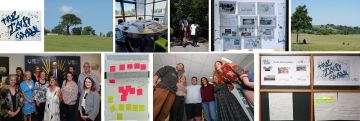The School of Business at SETU Waterford were delighted to host the inaugural Ink Way Academic Writers Workshops for doctoral research students, faculty and postdoctoral researchers across all SETU campuses in May and June.
The Ink Way is a four-day writing and walking workshop retreat, which aims to revitalise, refocus, and reframe enterprise research and researchers. Inspirational, engaged, and innovative, the Ink Way nurtures excellence in writing; deeper and embodied engagement with place and people; and joyful paths to research wellbeing.
Centred on the shared SETU theme of enterprise-in-place and underpinned by the principles of sustainable research, the Ink Way supports scholars to make their own green transition, to more social and environmental inclusivity. The Ink Way enhances writer confidence and competence, and its goal is co-create a community of preeminent practice.
It is co-led by Prof Felicity Kelliher, research lead at the RIKON Research Centre and Prof Sarah Dodd, the School’s resident professor of enterprise under the UK Joint Professor Scheme, and with guest facilitators Prof Friederike Welter of University of Siegen, Germany, Assoc. Prof. Margaret Heffernan of DCU and Dr Rachel Hilliard of University of Galway. The Ink Way is particularly innovative in that it immerses researchers in the green and blue ways of Waterford, offering specialist talks on sustainable engagement with our natural environment.
Head of School (Dean) of Business, Dr Tom O’Toole believes that the initiative “is a fantastic addition to both our school, community and our national writing support system for researchers and academics. In addition, to its immersion in writing for publication focus, it is thematic, designed around principles of place and sustainability which are core pillars of a responsible approach to management education”.
Speaking about the Ink Way approach, Profs Kelliher and Dodd outline the process. “The Ink Way moves through an action learning structure, following a carefully-designed writing journey. Day one is for diagnosis, with a deep dive into each participant’s writing ambitions, alongside tailor-made workshops and walks, analysing cutting-edge research contexts and challenges. Day two’s path moves on to planning and takes time to work on the enterprise research questions raised by context, vision and ambition. We walk through modern, high-impact and inclusivity methods for engaging these questions. Day three is for action, and data collection practices, trying out some innovative methods to answer the research questions we uncover together. Day four is our reflection workshop, where field data is analysed, draft findings written and imaged, and the writing process as a whole drawn together. We end with an Ink Way exhibition and reception, for ourselves and others, to share the week’s writings, and other creations.”
Participant feedback highlighted the value of the Ink Way, with participants reflecting on how the retreat has impacted their sense of self, inspired their teaching and kick-started some writing, while others expressed their ambitions for the future.
It was also noted that the Ink Way approach to academic writing could help future engagement with cross campus events.
The Ink Way exhibition for the student retreat was held on Thursday 1 June and for the faculty retreat on Friday 9 June; each at the ArcLabs Centre on Waterford’s West Campus, situated at the gateway of the Waterford Greenway. Professor Dodd explained: “Our small exhibition shares the artefacts, images, plans and writing from the Ink Way workshops, showing how we all engaged with enterprise, place and each other in new and creative ways, to shape writing, which is relevant, informed and exciting.”
Special thanks to Research Connexions Advanced Research Training Fund 2023 for the generous support of the Ink Way programme.


